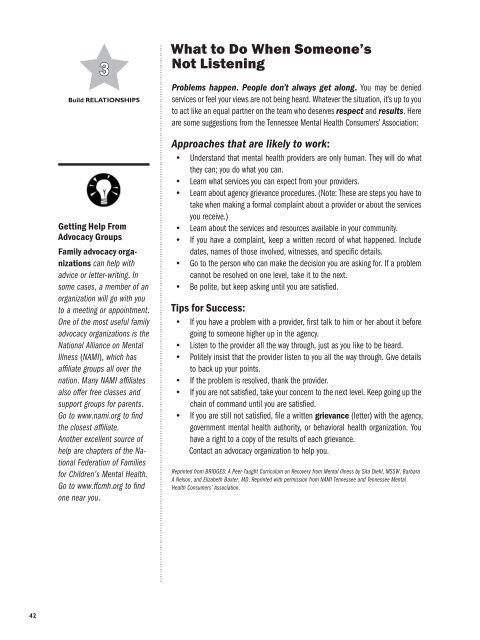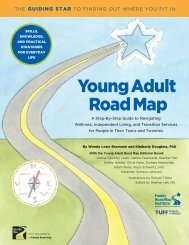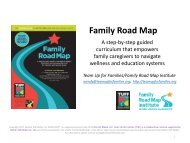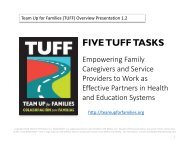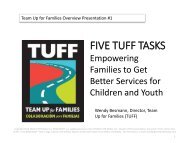Family Road Map Guide
Create successful ePaper yourself
Turn your PDF publications into a flip-book with our unique Google optimized e-Paper software.
3<br />
Build RELATIONSHIPS<br />
Getting Help From<br />
Advocacy Groups<br />
<strong>Family</strong> advocacy organizations<br />
can help with<br />
advice or letter-writing. In<br />
some cases, a member of an<br />
organization will go with you<br />
to a meeting or appointment.<br />
One of the most useful family<br />
advocacy organizations is the<br />
National Alliance on Mental<br />
Illness (NAMI), which has<br />
affiliate groups all over the<br />
nation. Many NAMI affiliates<br />
also offer free classes and<br />
support groups for parents.<br />
Go to www.nami.org to find<br />
the closest affiliate.<br />
Another excellent source of<br />
help are chapters of the National<br />
Federation of Families<br />
for Children’s Mental Health.<br />
Go to www.ffcmh.org to find<br />
one near you.<br />
What to Do When Someone’s<br />
Not Listening<br />
Problems happen. People don’t always get along. You may be denied<br />
services or feel your views are not being heard. Whatever the situation, it’s up to you<br />
to act like an equal partner on the team who deserves respect and results. Here<br />
are some suggestions from the Tennessee Mental Health Consumers’ Association:<br />
Approaches that are likely to work:<br />
• Understand that mental health providers are only human. They will do what<br />
they can; you do what you can.<br />
• Learn what services you can expect from your providers.<br />
• Learn about agency grievance procedures. (Note: These are steps you have to<br />
take when making a formal complaint about a provider or about the services<br />
you receive.)<br />
• Learn about the services and resources available in your community.<br />
• If you have a complaint, keep a written record of what happened. Include<br />
dates, names of those involved, witnesses, and specific details.<br />
• Go to the person who can make the decision you are asking for. If a problem<br />
cannot be resolved on one level, take it to the next.<br />
• Be polite, but keep asking until you are satisfied.<br />
Tips for Success:<br />
• If you have a problem with a provider, first talk to him or her about it before<br />
going to someone higher up in the agency.<br />
• Listen to the provider all the way through, just as you like to be heard.<br />
• Politely insist that the provider listen to you all the way through. Give details<br />
to back up your points.<br />
• If the problem is resolved, thank the provider.<br />
• If you are not satisfied, take your concern to the next level. Keep going up the<br />
chain of command until you are satisfied.<br />
• If you are still not satisfied, file a written grievance (letter) with the agency,<br />
government mental health authority, or behavioral health organization. You<br />
have a right to a copy of the results of each grievance.<br />
Contact an advocacy organization to help you.<br />
Reprinted from BRIDGES: A Peer-Taught Curriculum on Recovery from Mental Illness by Sita Diehl, MSSW, Barbara<br />
A Nelson, and Elizabeth Baxter, MD. Reprinted with permission from NAMI Tennessee and Tennessee Mental<br />
Health Consumers’ Association.<br />
42


